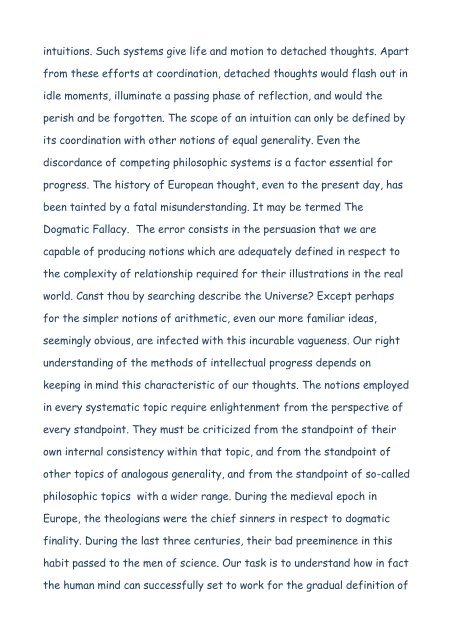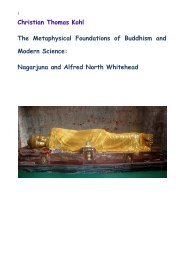The Metaphysical Foundation of Buddhism and Modern Science
The Metaphysical Foundations of Buddhism and Modern Science: Nagarjuna and Alfred North Whitehead
The Metaphysical Foundations of Buddhism and Modern Science: Nagarjuna and Alfred North Whitehead
You also want an ePaper? Increase the reach of your titles
YUMPU automatically turns print PDFs into web optimized ePapers that Google loves.
intuitions. Such systems give life <strong>and</strong> motion to detached thoughts. Apart<br />
from these efforts at coordination, detached thoughts would flash out in<br />
idle moments, illuminate a passing phase <strong>of</strong> reflection, <strong>and</strong> would the<br />
perish <strong>and</strong> be forgotten. <strong>The</strong> scope <strong>of</strong> an intuition can only be defined by<br />
its coordination with other notions <strong>of</strong> equal generality. Even the<br />
discordance <strong>of</strong> competing philosophic systems is a factor essential for<br />
progress. <strong>The</strong> history <strong>of</strong> European thought, even to the present day, has<br />
been tainted by a fatal misunderst<strong>and</strong>ing. It may be termed <strong>The</strong><br />
Dogmatic Fallacy. <strong>The</strong> error consists in the persuasion that we are<br />
capable <strong>of</strong> producing notions which are adequately defined in respect to<br />
the complexity <strong>of</strong> relationship required for their illustrations in the real<br />
world. Canst thou by searching describe the Universe? Except perhaps<br />
for the simpler notions <strong>of</strong> arithmetic, even our more familiar ideas,<br />
seemingly obvious, are infected with this incurable vagueness. Our right<br />
underst<strong>and</strong>ing <strong>of</strong> the methods <strong>of</strong> intellectual progress depends on<br />
keeping in mind this characteristic <strong>of</strong> our thoughts. <strong>The</strong> notions employed<br />
in every systematic topic require enlightenment from the perspective <strong>of</strong><br />
every st<strong>and</strong>point. <strong>The</strong>y must be criticized from the st<strong>and</strong>point <strong>of</strong> their<br />
own internal consistency within that topic, <strong>and</strong> from the st<strong>and</strong>point <strong>of</strong><br />
other topics <strong>of</strong> analogous generality, <strong>and</strong> from the st<strong>and</strong>point <strong>of</strong> so-called<br />
philosophic topics with a wider range. During the medieval epoch in<br />
Europe, the theologians were the chief sinners in respect to dogmatic<br />
finality. During the last three centuries, their bad preeminence in this<br />
habit passed to the men <strong>of</strong> science. Our task is to underst<strong>and</strong> how in fact<br />
the human mind can successfully set to work for the gradual definition <strong>of</strong>


















